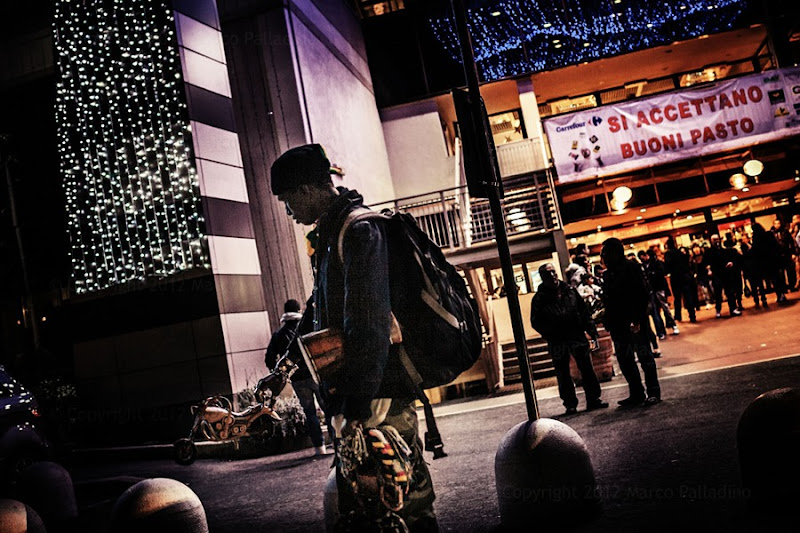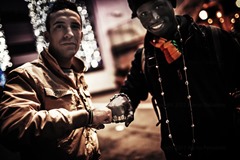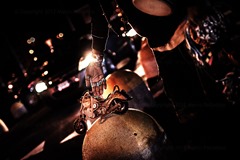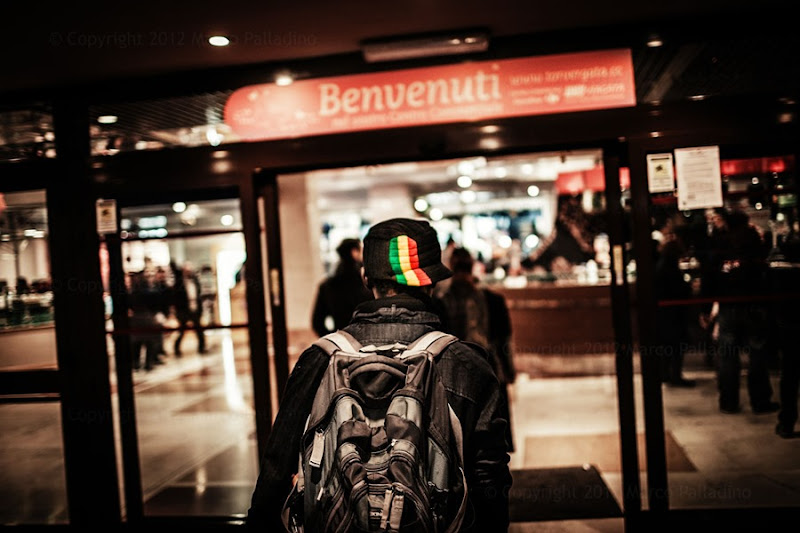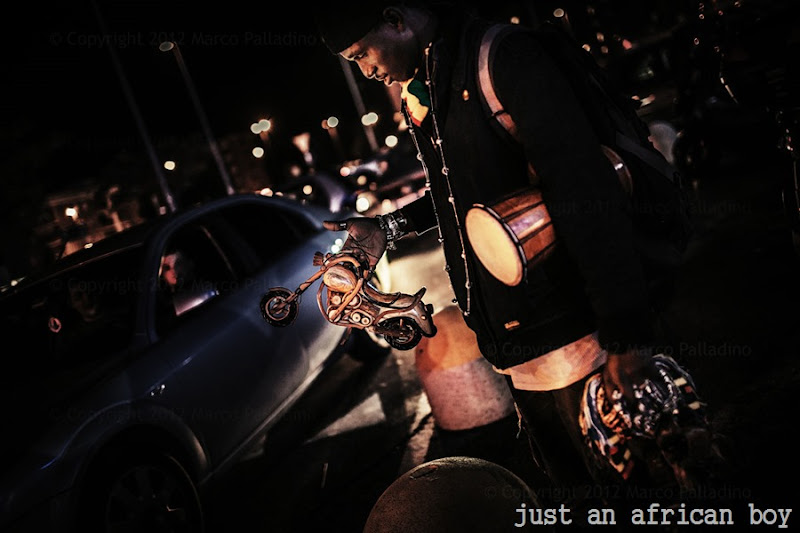social reportage by M.Palladino
 Mamadou sells the classical artefacts from Africa, necklaces, jewellery and more sophisticated ones, the motorcycle, inlaid in the wood, that he shows off with pride, and the percussions, that I happily purchase remembering where it came from my old passion for the drums. It amazes me by telling me of his work, that at home was the craftsman indeed. He constructed himself these drums. Now they send them to him to be sold in the streets.
Mamadou sells the classical artefacts from Africa, necklaces, jewellery and more sophisticated ones, the motorcycle, inlaid in the wood, that he shows off with pride, and the percussions, that I happily purchase remembering where it came from my old passion for the drums. It amazes me by telling me of his work, that at home was the craftsman indeed. He constructed himself these drums. Now they send them to him to be sold in the streets.His simple socializing smile and wish to talk maybe just to look at each in the eyes and to be seen by someone, these are things that capture you, his humanity is distilled in expressions that only respond to one thing: he is owner of his life. Mamadou is a poor man but a free one. Does not blame the world for his condition, even though he went away from his country to escape the war, among other things. His phrase catches me, when I ask again: So how is your life? A question from western point of view, of course ... his response could be translated as follows: half and half, or I'm not complaining, it goes on. But it sounds different here, he says it with a smile, with the awareness of a man of the world, who is not asking himself too many blank questions . Who does not always keep asking what happiness is, nor what he lacks to reach it. This is his life and that's all. Obviously he is not resigned to this way forever.
He built a network of support, including friends and relatives who live in Rome and, he says, he feels protected. But again my question is a bit 'empty’ and induced to a response by someone who does not seem troubled by the fact of being a foreigner and precarious man in a consumer and individualistic society. He no longer has many ties with his homeland, no longer has a family there, his few close relatives live in Rome. It 's clear that it must not be easy to be able to make it in this city where it is hard for many to live in welfare, but he makes it, in some way. Obviously it must be possible for everyone then.
After leaving the hall he is intercepted by two rude boys that ask him a gift of two bracelets, he's giving them immediately and with a smile. We could do a lot of speculation about the significance of this episode, many parallels with the poverty of mind of those who have much but always think that something is missing and those who have very little but smile. Things that make you have a stomach ache, but once again these are my projections, from a Western point of view. It 's so that Mamadou lives his life.
After this, he meets a friend who does the same job and there are a thousand smiles between them, real smiles, a habit, even defensive in certain circumstances, but of who always responds with a smile to a meeting, whatever that is. The suspect, once again, is that in comparison with what he has left all this must be a less threatening way of life . It 's something that we can only imagine, but basically you see also the desire to move, not to imagine own life as a cage just because fate has put you there. That 's what you say yourself, he simply talks about his projects as of things that will happen, just will take place.
Not all people from Africa take their life and go away, not everyone does it. We tend to forget too easily that the Africans we encounter in our cities often are an elite. Cultural elite sometimes, others only by vocation and awareness. So they look: mild but not resigned, serene faces, citizens of the world, indeed.
I put a lot of my mind at this spontaneous encounter that I live without any journalistic pretence, a meet that takes place at the right time for me, as a proof that the right thing is always to just go out and to be dressed only with the desire to see, hear, smile and forget what we believe we miss ... to be rewarded by the simplicity of those who have nothing but fill your heart with a smile.
My friend, another silent protagonist of this episode, is amazed by the meet. His emotional problems that had troubled his face, otherwise always very cheerful, suddenly disappear , his reflection with a guy who comes from so far away is total. He finishes with attributing to Mamadou some almost heroic virtues, those of who is free and has the power to choose, who is able to always look ahead with confidence, things that he is learning to defend with pride in a world full of opulent and scared people.
I would like to dissuade him, to give him my point of view, which is perhaps still too cynical, it’s a cynicism of the exteriority, acquired in my life. But I do not. I do not believe in the "myth of the noble savage" always revived by a Western culture aiming to the rediscovery of the obvious. I truly believe that men are all the same, brave or miserable depending on the circumstances. But this time I can not feel right. The two greet each other with a big and spontaneous hug. I simply can not.
©2012 Marco Palladino – all rights reserved

